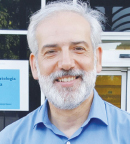In an analysis reported in the Journal of Clinical Oncology, Gianni Bisogno, MD, PhD, and colleagues detailed 5-year outcomes among children and adolescents with nonmetastatic rhabdomyosarcoma in the European Pediatric Soft Tissue Sarcoma Study Group RMS2005 Study.
Study Details
The RMS2005 study included two phase III randomized trials for high-risk patients and observational trials for low-risk, standard-risk, and very high–risk patients. A total of 1,733 patients with nonmetastatic rhabdomyosarcoma were included in the analysis.

Gianni Bisogno, MD, PhD
Key Findings
Median follow-up was 73.1 months.
Among all 1,733 patients, 5-year event-free survival and overall survival were 70.7% (95% confidence interval [CI] = 68.5%–72.8%) and 80.4% (95% CI = 78.4%–82.3%), respectively.
Among 80 low-risk patients, 5-year event-free survival and overall survival were 93.7% (95% CI = 85.5%–97.3%) and 96.7% (95% CI = 87.2%–99.2%), respectively.
Among 652 standard-risk patients, 5-year event-free survival and overall survival were 77.4% (95% CI = 73.9%–80.5%) and 90.6% (95% CI = 87.9%–92.7%), respectively. Respective rates according to subgroups were 87.4% and 93.2% for subgroup B, 76.9% and 93.4% for subgroup C, and 73.3% and 84.0% for subgroup D.
Among 851 high-risk patients, 5-year event-free survival and overall survival were 67.3% (95% CI = 64.0%–70.4%) and 76.7% (95% CI = 73.6%–79.4%), respectively.
Among 150 very high–risk patients, 5-year event-free survival and overall survival were 48.8% (95% CI = 40.4%–56.7%) and 49.7% (95% CI = 40.8%–57.9%).
The investigators stated: “The analysis of the whole population included in the RMS2005 study demonstrates that 80% of children with nonmetastatic rhabdomyosarcoma can be long-term survivors. Considering this analysis and additional data, changes in comparison with previous European standards can be proposed:
- A 22-week alkylating-free regimen can be adopted for low-risk patients
- The cumulative dose of ifosfamide can be reduced in the standard-risk group
- Anthracyclines can be omitted in standard-risk subgroup D and high-risk patients without compromising the outcome
- The optimal duration of chemotherapy needs to be investigated; in the meantime, we suggest 27 weeks of standard chemotherapy, with the addition of maintenance chemotherapy for high-risk patients.”
Dr. Bisogno, of the Department of Women’s and Children’s Health, University of Padua, and Pediatric Hematology Oncology Division, University Hospital of Padua, is the corresponding author for the Journal of Clinical Oncology article.
Disclosure: The study was supported by the Fondazione Città della Speranza and Alice’s Arc. For full disclosures of the study authors, visit ascopubs.org.

